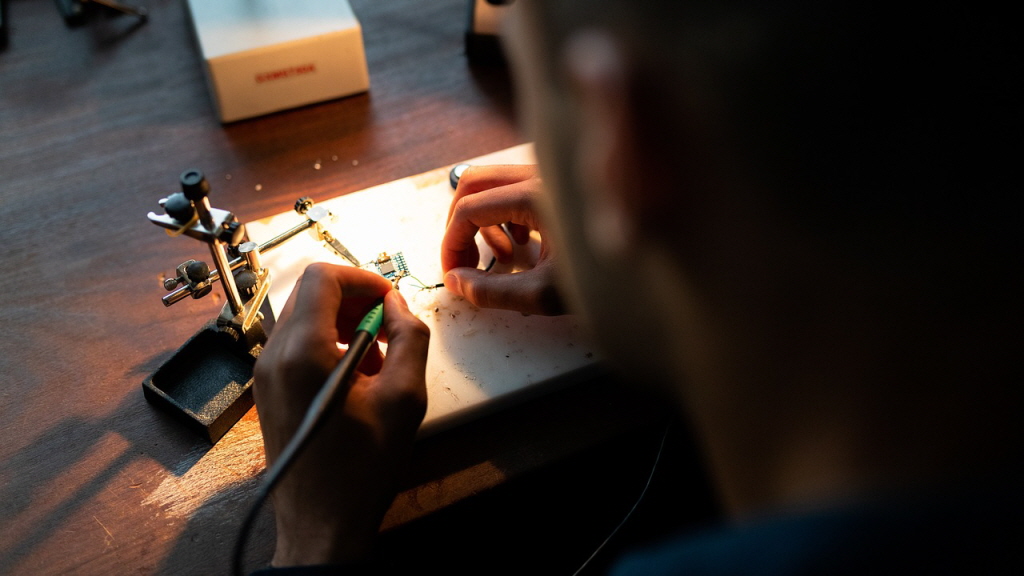특성화고 및 공과대학 전자공학과 학생들의 납땜 기피 현상으로 인해 관련 교수들이 전자공학 하드웨어 교육에 애를 먹고 있는 것으로 나타났다. 특히 납땜 교육을 금지하고 있다는 유언비어가 돌기도 했는데, 본지가 서울특별시교육청 진로직업교육과에 문의한 결과 납땜 교육을 금지하는 법은 없는 것으로 나타났다. 오히려 정부는 안전교육을 실시하고, 특수건강검진을 지원해주고 있다고 밝혔다.
교수들 납땜 교육 금지 유언비어도 돌아, 금지 법규 無
교육청 실습 운영, 환기·건강검진 등 오히려 교육 지원
전원설계 등 하드웨어 자유자재 다루려면 납땜부터 시작
“학교 교육 과정에서 학생들의 납땜 기피 현상이 심화하고 있어 하드웨어 교육을 도면이나 시뮬레이션으로 대체하고 있는데, 결국은 학생들이 학교 졸업하고 개발자가 돼서 부족함을 느끼고 학원에 가서 다시 납땜을 배우고 있습니다. 교육 환경은 학교가 더 좋은데 안타까운 현실입니다”
최근 본지가 공과대학 전자공학과 하드웨어 교육과 관련해 취재한 결과 학생들의 납땜 교육이 어려움을 겪고 있는 것으로 나타났다.
본지가 취재한 한 교수의 경우 제대로 된 하드웨어 교육을 위해 PCB 상에서 납땜을 통해 실제 회로를 구현하게 하고, 결과물에 일부러 고장을 낸 다음 오류를 찾아 납땜을 통해 문제를 수정하는 교육을 진행하는데 학생들의 참여도가 점점 낮아지고 있다고 전했다.
이는 문제 해결 과정이 어렵기도 하지만 학생들이 납땜하는 것을 싫어한다는 것이다.
해당 교수의 이야기를 빌리자면 학생들의 경우 학점 획득이 가장 큰 목적이기 때문에 납땜 등 실습과 관련된 강의는 기피하는 경향이 있다고 전했다.
해당 교수는 납땜하지 않는 경우 학점을 주지 않기 때문에 강의 참여율이 저조하고, 강의평가에서 학생들로부터 항의 아닌 항의를 받고 있다고 언급했다. 오히려 학생들에게 제대로 된 교육을 진행하려는 교수들이 학생들의 외면을 받는 것이다.
일부 교수들의 경우 납땜을 하지 않고, 도면이나 시뮬레이션 교육으로 대체하는 경우가 많고, 또 교수들 사이에서 납땜 교육이 금지돼 있다는 말도 돌기도 했다는 후문이다.
이에 본지가 서울특별시교육청 진로직업교육과에 직접 문의해 알아본 결과 납땜 교육은 전혀 문제가 없는 것으로 나타났다.
오히려 특성화 고등학교의 경우는 ‘초·중등교육법’ 및 교육부 고시에 따라 학교별 교육과정 및 실습 운영 계획에 따라 2024년에는 서울시 관내 18개 학교에서 납땜 교육을 시행한 것으로 나타났다.
또한 실습 시 학생 안전 확보를 위해 ‘산업안전보건법’, ‘학교안전사고 예방 및 보상에 관한 법률’, ‘학교보건법’ 및 ‘학생안전기본법’에 따른 관련 지침을 적용해 납땜 실습 시 실험·실습실 내 안전 수칙 등 안전교육을 필수로 실시하고 있는 것으로 나타났다.
추가로 교육청의 건강관리지원 사업으로 전자과 납땜 실습실을 비롯한 유해인자 노출이 우려되는 모든 실습실에 대해 작업환경측정을 실시하고, 매년 해당 실습실의 학생 및 교사에 대해 특수건강검진을 시행하고 있다고 밝혔다.
이에 특성화고나 대학 등에서 납땜 교육은 법률상 허용되는 교육과정임이 명확한 것이다.
이런 현상과 맞물려 전자공학과 졸업생 중 하드웨어 개발자가 된 현직 신입 개발자들의 경우 하드웨어 개발 과정에서 부족한 문제 해결 능력을 키우기 위해 학원에 다니며 오히려 납땜을 실습으로 하는 교육에 더 적극적으로 참여하고 있는 것으로 나타났다.
오히려 실력 있는 교수진·환기 등 안전 측면에서 학교가 더 우수하지만, 잘못된 정보 및 학생들의 기피 현상으로 제대로 된 교육이 이뤄지지 않고 있는 것이다.
물론 납의 경우 중금속으로 인체에 심각한 영향을 줄 수 있어 안전관리가 요구되는 물질이다.
이에 마스크 착용 및 환기 장치 설치를 통해 안전을 확보하고 교육을 진행하고 있으며, 서울시교육청을 비롯해 시도 교육청이 수시로 실습실 안전관리 실태를 점검하고 있다고 밝혔다.
이런 위험성에도 불구하고 납땜 교육을 진행할 수밖에 없는 이유는 전자회로를 비롯해 전자제품 등 하드웨어를 정확하게 이해하기 위한 필수적 교육과정이기 때문이다.
특히 하드웨어의 경우 EMI(전자파 방해), 전원설계 등 다양한 문제를 해결하기 위해서는 실제 PCB 위에서 각종 IC, 커패시터, 저항 등 전자부품들을 직접 조립하고 분해·변경할 수 있어야 하는데, 납땜을 못 하면 애초에 시작도 하지 못하는 것이다.
전자공학 관련 교수들은 하드웨어 개발 및 문제를 수정하려면 다년간의 경험이 필요하므로 학생들이 시뮬레이션 도구들을 다루는 것도 중요하지만 가장 기초적인 납땜부터 친숙해져 실제 PCB 상에서의 회로 수정이 자유자재로 이뤄져야 한다고 입을 모으고 있다.
